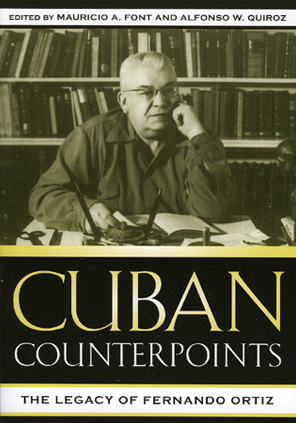Cuban Counterpoints: The Legacy of Fernando Ortiz
Lexington Books, 2004
Editors: Mauricio Font and Alfonso Quiroz
While Fernando Ortiz’s contribution to the understanding of Cuba and Latin America has been widely recognized since the 1940s, recently there has been renewed interest in this scholar and activist who made lasting contributions to a staggering array of fields. This volume – a compilation of work by scholars from Cuba, Mexico, the United States and Europe – probes Ortiz’s vast oeuvre and provides a timely and provocative reassessment of his legacy.
Embracing simultaneity, inherent contradiction and hybridity, the Ortizian perspective has remarkable relevance to the current debate about Latin America’s complex and evolving societies. Cuban Counterpoints explores the bold new perspectives that Ortiz brought to bear on social science and Cuban society. These 20 essays discuss his profoundly influential approach to transculturation, Afro-Latin culture, race relations, and such major themes in Cuban society and history as the roles of tobacco and sugar, civil society, religion and law, national identity, intellectual and political dynamics during the Republic, music, and literature. Together, these essays provide a convincing portrait of a major social thinker and great Cuban.
“This interesting collection of essays…highlights how relevant Ortiz’s writings are to understanding contemporary as well as historical trends in the Americas.”
–Susan Eckstein, Boston University
“This volume is a compelling encounter with the many personas of Fernando Ortiz – anthropologist, lawyer, politician, humanist, and, perhaps most important, Cuban visionary. Ortiz’s multidisciplinary contributions are approached with respect, affection, critical consciousness, and a welcome playfulness rarely seen in academic anthologies. Whether you are already familiar with the huge corpus left by Ortiz or discovering him for the first time, let this volume be your guide to the exuberance of Ortiz’s legacy, which is not only a gift to Cuba but to our globalized world, struggling with ever more pathos to figure out why culture still matters.”
–Ruth Behar, University of Michigan
Table of Contents:
Introduction:
“The Intellectual Legacy of Fernando Ortiz”
Mauricio Font, Alfonso W. Quiroz, and Pamela Maria Smorkaloff
Part I: Life and Education
• “Fernando Ortiz, My Father”
María Fernanda Ortiz Herrera
• “Spanish Intellectuals and Fernando Ortiz (1900-1941)”
Consuelo Naranjo Orovio and Miguel Angel Puig-Samper Mulero
• “It All Started In Madrid”
Octavio di Leo
• “Ethnography at the University of Havana”
María del Rosario Díaz
Part II: Interpreting Cuban History
• “Transculturation and Nationalism”
Rafael Rojas
• “The Early Republic: Politics, Civic Culture, and Sovereignty”
Marifeli Pérez-Stable
• “The Political Ideas of Fernando Ortiz (1906-1933)”
Carmen Almodóvar
• “Economic Historian and Editor of Cuban Classics”
José Matos Arévalos
• “Tobacco in the Contrapunteo: Ortiz and the Havana Cigar”
Jean Stubb
Part III: Social Sciences and Law
• “Economic Sociology and Ortiz’s Counterpoint”
Enrique S. Pumar
• “Transcultural Anthropology in the Américas (with an Accent): The Uses of Fernando Ortiz”
Fernando Coronil
• “Poetry in the Presidio: Towards a Study of Proyecto de Código Criminal Cubano”
Alejandra Bronfman
Part IV: Racial Diversity, Religion and National Identity
• “The Term Afro-Cuban: A Forgotten Contribution”
Tomás Fernández Robaina
• “Transculturation a la Ajiaco: A Recipe for Modernity”
Patricia Catoira
• “Religion in the Work of Fernando Ortiz”
Jorge Ramírez Calzadilla
Part V: Literature and Music
• “The Counterpoint and Literature”
Roberto González Echevarria
• “Of How Fernando Ortiz Found an Elusive Maiden for an Enchanted Gentleman”
Ricardo Viñalet
• “Comparative Analysis of Theoretical Symbols”
Antonio Fernández Ferrer
• “Stirring the Ajiaco: Changüí, Son, and the Haitian Connection”
Benjamin Lapidus
• “Fernando Ortiz, Founder”
María Teresa Linares Savio

